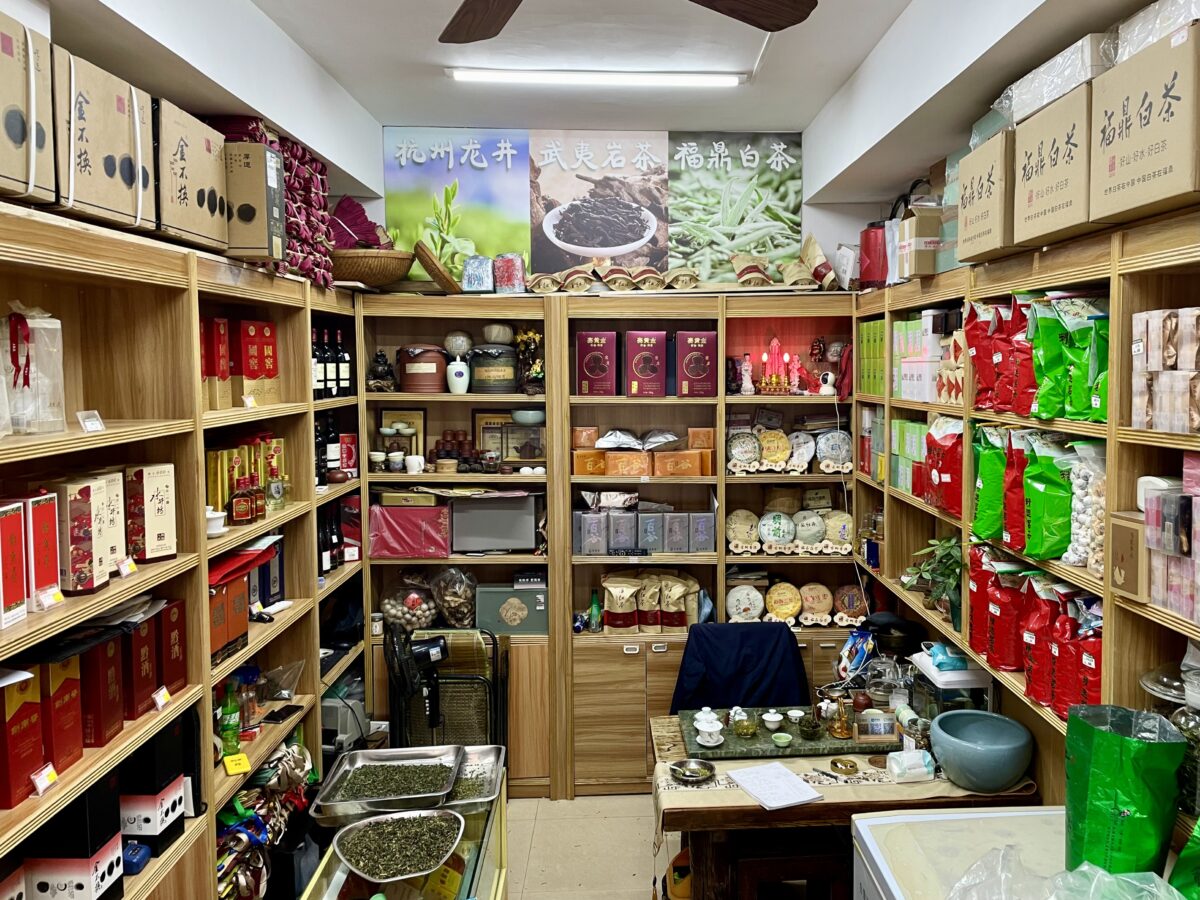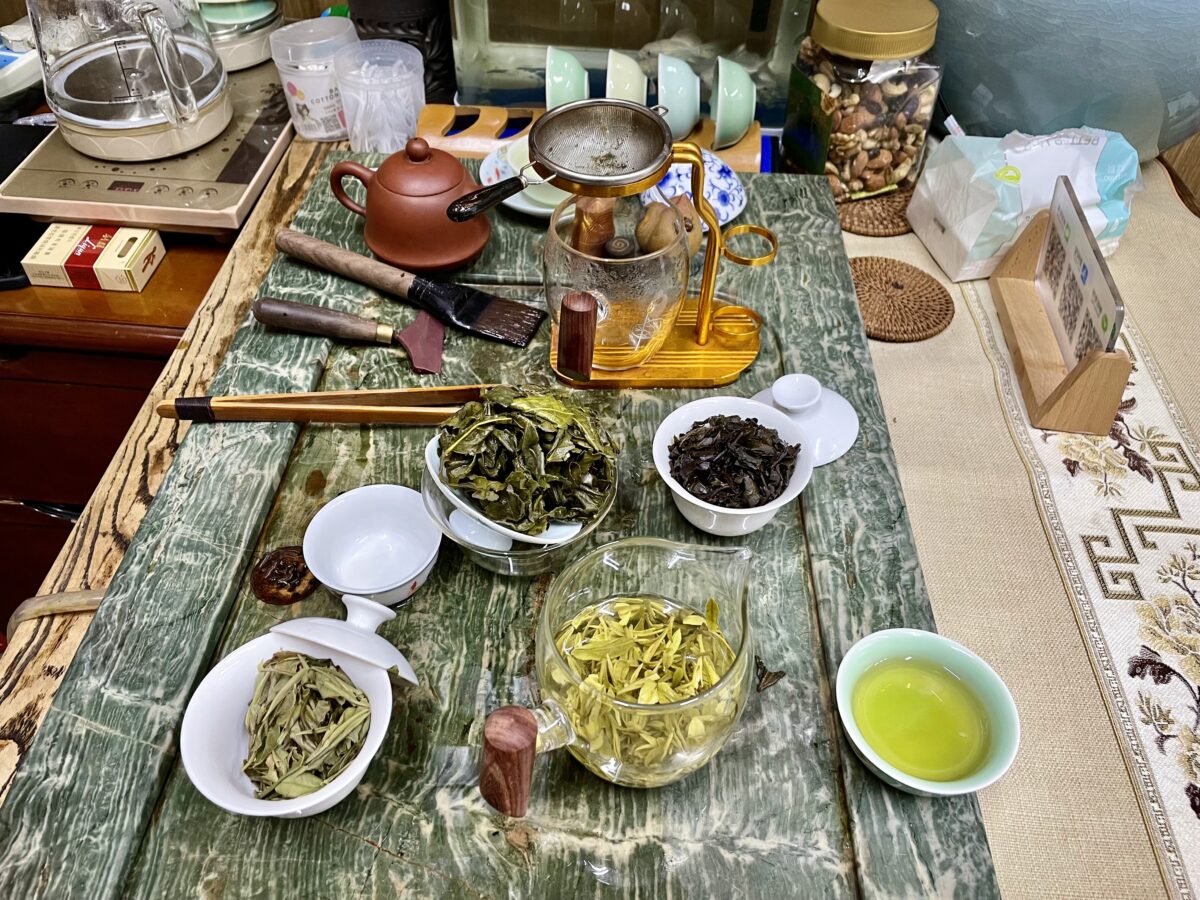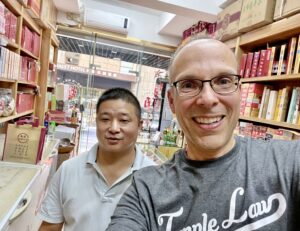Tucked behind a nondescript storefront a few blocks from the Shanghai Bund, Nan Yuan (“South Garden”) is typical of the many neighborhood tea shops dotting the city. Owner Zhou Jinyi has been in the business for years and knows his market well. Although customers often turn to tea for relaxation and comfort, a day at Nan Yuan is anything but.
“The days of luxury consumption are over,” said Zhou, “and each sale is a tough slog.” As I sat with Zhou one day, he would abruptly pause our conversation to try to make a sale each time a customer walked in.
“Do you have Tieguanyin?” asked a customer, and Zhou showed him various grades. Without asking to try any, the customer asked, “How much?” Zhou knew right away this was a low spender, so he showed him the cheapest, for 30 yuan (US$4) per half kilo. The customer scoffed and walked out. “You see,” Zhou said to me, “people just aren’t buying.”
He said that older Shanghainese prefer green tea, such as Huangshan Maofeng. Younger customers have no particular preference. “There is no formula to selling tea,” he said, explaining how he relies on experience to gauge which tea the buyer might want. “I can influence their choices by offering tea tasting and making recommendations.”

When in doubt, Zhou’s go-to tea is Tieguanyin, a fail-safe oolong. “The classic orchid aroma appeals to everyone. It can be strong or light depending on how the tea was baked.” Tieguanyin is also easy to brew, making it easy to sell. While it can be “steeped in a coffee mug,” Zhou prefers the gaiwan or the lidded bowl used in the Gongfu tea ceremony.
Neighborhood tea stores in China rarely just sell tea. Although tea and coffee are grouped together in the West, in China, tea is often sold alongside tobacco and alcohol products. Zhou added teaware and bottled soft drinks to his inventory mix. “I can’t survive on selling tea alone,” he rued.
The high-end tea store ideal in China centers on tea, featuring specially trained tea servers, Chinese art and décor, and calming music. They cater to businesses, government, tea enthusiasts, socialites, and the health-conscious who buy tea for themselves or as gifts. Neighborhood tea stores, however, serve a broader, more economically diverse clientele.

Zhou’s tea table is cluttered with a hodgepodge of items, including a calculator, scale, ashtray, dental floss, and an assortment of cups, pouring pitchers, and utensils. He keeps a large plastic jug of raisin nut mix on the table, using the screw-top lid as a plate for a dual-purpose snack and palate cleanser.
Abutting Zhou’s tea tray is a blue ceramic planter pot with his pet small turtle crawling around inside. In Chinese culture, the tortoise symbolizes long life and stability due to its long life span. To keep the turtle company, there is a figurine of a golden toad with a coin in its mouth, believed to beckon wealth. Together, Zhou said, they are signs of a happy life.
Also next to the tea tray is a small aquarium with dwarf koi. “Goldfish are symbols of wealth,” he said, and they also make customers feel at home “like a stranded fish put back in water” referring to a Chinese idiom to describe someone who is glad to be back in their proper surroundings after time away in an unfamiliar or uncomfortable location.
Zhou offers a range of Chinese teas with the broadest appeal. He sometimes pulls out a price list, with the teas listed in this order: jasmine, Dragon Well, Pu’er, Tieguanyin, black, blooming, aged white, Dahongpao, aged white, and tangerine pu’er. If a customer shows interest in any tea on the menu, Zhou starts there with a tasting, price negotiation, or both.
During my visit, we tried many teas, from white to green to black, ending with Tieguanyin. He brews all teas Gongfu style, using both porcelain and clear glass gaiwans. “Filtered water is fine to make tea,” he said, using neither tap nor bottled water. He measured 8 grams of the tightly rolled Tieguanyin into a large gaiwan and poured nearly boiling water into it.

“I’m getting peach,” I told him after the first sip, perceiving peachy notes to the flavor. To Zhou, this infusion had yun, a term literally meaning rhyme, but used in tea parlance to describe an overall pleasant feeling from the tea’s gracefulness. In the West, we often look for specific flavor profiles, whereas Zhou said the descriptors are more abstract in China.
“Tieguanyin reminds many people of their childhood, including my own,” Zhou said, saying how people often buy teas reminiscent of the teas their family brewed during their childhood. This reminded me of a Chinese idiom, “past experience, if not forgotten, is a guide for the future.” Quiet time drinking tea indeed sets the scene for personal reflection.
The Nan Yuan tea store is representative of the many neighborhood tea stores I visited throughout China. In these spaces, the day-to-day grind of the consumer retail tea business comes into full view. Zhou’s tea was on par with those I tried at any high-end store or tea farm, reflecting the reality that the tea itself is more important than the packaging.
Nan Yuan is open from 8 am to 11 pm. It is located at 553 Hankou Lu, Huangpu District, Shanghai, near the People’s Square metro station.
Tea Market
Get More Value from Your Tea: BRU Maker One
+41794574278
Jacque's Organics
(647) 804-7263
I so enjoyed this article, especially the descriptions that the Chinese have for the teas. Such a way with expressions that I admire.
Thank you, Paula! My experience in China has been that there is often great precision with the volume of water, amount of tea, and brewing times. The descriptions of the infusions tend to be more literary and abstract, or sometimes not used at all–letting the tea speak for itself!